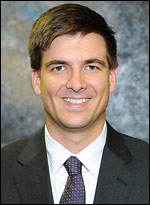Jeff Olmstead for a long time resisted the call of oil and gas that is in his blood. Last year, however, he took Dallas-based Mid-Con Energy public as its president and chief financial officer.

Olmstead, BE’99, majored in both electrical engineering and mathematics at Vanderbilt, and worked summers at Mid-Con building fences and painting alongside the guys in the oil field. Olmstead’s father, Mid-Con CEO Randy Olmstead, got into the oil business in the early 1980s, working as an independent CPA but managing about 15 rotary rigs on the side.
“Having worked in the hot sun and watched my dad’s fortunes go up and down, I wanted to do something different,” said Olmstead, who put his degree to work for several years in telecommunications before getting interested in the finance side of the energy business.
He returned to Nashville for his MBA (’06) at Vanderbilt’s Owen School and then went to work for Bank of Texas, where he was an oil and gas lender. One of his customers, Primexx Energy Partners LLC, hired him as chief financial officer in 2010. It is a family-owned company but many times bigger than the company his father began.
“I had intended to make a career there (at Primexx) but by that time Mid-Con, as it neared maturity, had entered its first round of private equity funding. Having the opportunity to work on an IPO with your dad is pretty unique and special,” Olmstead said. Going public was quite a ride, he admits, and there were parts of the process “I’d be happy never to do again.”
On the upside, he said, a smaller company such as Mid-Con has the opportunity to make meaningful smaller acquisitions and even delve into some innovative research and development opportunities.
Currently most of Mid-Con’s properties produce oil using a secondary method called water-flooding—injecting water in oil and gas wells and filling up the space voided by previous production to repressurize the reservoir. The process is not new or unique, he said, and the time from acquisition to production can take several years.
The nature of the energy business is that there’s always going to be constant change and the potential for surprise, both of which Olmstead likes. “Most exciting is what some of us like to call the stumble factor,” he said. “Many times, you might be drilling a well and happen to drill through something you didn’t know was there and you make a new discovery. It can happen anytime, anyplace.” He chuckled and added, “You try to keep it quiet so you can lease everything around it, but suddenly 10 of your best friend competitors are trying to beat you to it.”
Olmstead advises new graduates to be willing to start at the bottom. “There are so many things you would miss otherwise,” he said. It’s important to understand and embrace the risks.
“There are plenty of booms and busts, and lots of very good business people get caught on the wrong side of a cycle, and it will happen again. It always does.”